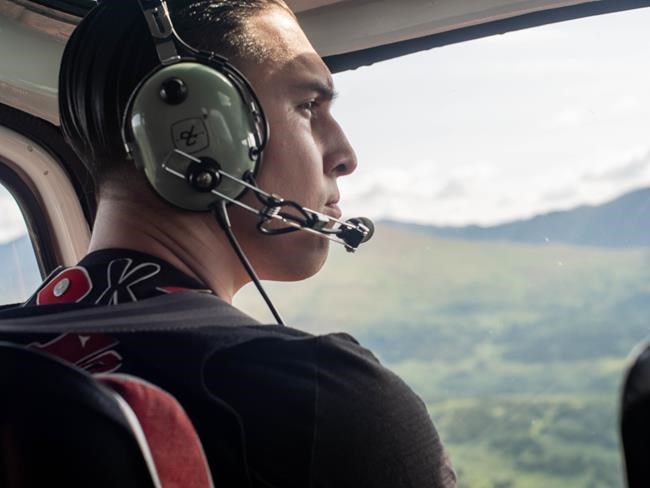
President of the Tahltan Central Government Chad Norman Day surveys Tahltan territory by helicopter in this July 2019 handout photo. The British Columbia government says it has entered the first "consent-based" decision-making agreement with the First Nation over land use, changing the way resource projects move forward in the territory. THE CANADIAN PRESS/HO - Tahltan Central Government
June 06, 2022 - 4:47 PM
VICTORIA - The British Columbia government says it has entered a first-of-its-kind "consent-based" agreement with a First Nation over land use, changing the way resource projects move forward in its territory.
The agreement with the Tahltan Central Government affects how decisions are made as part of the environmental assessment process for the Eskay Creek mining project, but the province said the shared intent is to create a model for sustainable mining and environmental standards.
Premier John Horgan announced the agreement Monday, saying it represents a "true partnership" between the Tahltan and the province that recognizes the nation's rights and title.
"Globally, this is profound," Horgan said. "When investors look to British Columbia, they will look to a territory, a jurisdiction, that has shared decision-making at its foundation so that we can develop the unique resources that we have here to meet the needs of a changing environment."
The deal is the first in Canada made according to the United Nations Declaration on the Rights of Indigenous Peoples, said Murray Rankin, minister of Indigenous relations and reconciliation. The declaration calls for the free, prior and informed consent of Indigenous Peoples when governments make decisions that affect them.
In November 2019, British Columbia adopted the Declaration Act into law, making it the first jurisdiction in the country to formally implement it.
However, the NDP government has repeatedly said that free, prior and informed consent does not mean "veto power" over proposed resource projects. That was reiterated Monday.
"It's not a veto power, but what it is, is the opportunity for consent to be provided," Rankin said.
The difference between a typical environmental assessment process and a consent-based one, is that the Tahltan will have an opportunity to give consent to the process in advance, Rankin said. The B.C. government will then conduct the assessment and if it passes, the project will go straight to permitting.
"Our hope is that because of the robust involvement of the Tahltan along the way, with the environmental assessment side of things, the permitting should go much more quickly," Rankin said.
The goal is also for the B.C. environmental assessment to replace any federal one, he said.
Tahltan president Chad Norman Day said it's "extremely important" that the nation's rights and values are at the heart of any project on its territory. Becoming the first Indigenous group to sign such an agreement is an accomplishment, he said.
"I often tell people that whether the government is orange, or red, or blue or green, the Tahltan nation is always going to be covered in a lot of gold, silver, copper and a lot of other minerals. So, it's important that we build these structures, and that we do it properly," he said.
Tahltan territory covers about 11 per cent of the province and contains the richest mineral potential in B.C., including the “Golden Triangle,” where private-sector investment has been and continues to be significant, according to the B.C. government.
The proposed mine at Eskay Creek is about 85 kilometres northwest of Stewart, B.C.
Skeena Resources Ltd. acquired the land in 2020 and has proposed a new high-grade, open-pit gold and silver mine at the site. It was previously the location of an underground gold and silver mine from 1994 until it closed in 2008.
Justin Himmelright, senior vice-president of external affairs and sustainability with Skeena Resources, said the original mine left a legacy of assets including road access and tailings management facilities.
"The part that has been missing from the Eskay Creek project is, because it was permitted in an era when Indigenous consent was not the standard of the day, it never achieved formal consent from the Tahltan nation," he said.
Himmelright called that consent a "very, very important step" that will be foundational to the project's success.
The mine is projected to generate $730 million in provincial tax revenue and create 300 to 500 jobs, he said.
The B.C. government said the consent agreement sets out how the Tahltan and the province will be accountable and transparent throughout the environmental assessment process, how they will work together, and it includes a provision for dispute resolution.
Day said the Tahltan nation already has a robust internal system for reaching consensus among its members.
"The Tahltan people will ultimately decide whether or not this project goes through. The way that this is structured, is that our consent is needed in order to operationalize and build this project, so it's something that the Tahltan nation has never had before in an agreement," Day said.
"We have more tools in the tool kit than ever before."
— By Amy Smart in Vancouver.
This report by The Canadian Press was first published June 6, 2022.
News from © The Canadian Press, 2022